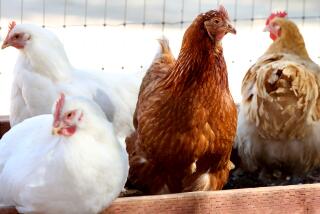Let Bats Stay in the Belfry : Going to Britain? Yield the Road to a Toad
- Share via
LONDON — The love of animals is legendary in Britain, where signs warn motorists against running over toads and an ambassador was flooded with hate mail because he left a pet rabbit behind when he was expelled from Libya.
A survey published in the February edition of Options, a general-interest magazine, found that one person in 10 considers pets more important to their happiness than their spouses, while 21% preferred animals over children.
One-third of those surveyed valued their furry companions above their jobs, 16% considered them more important than their health and 94% would rather play with their pets than watch television.
The land where the first animal protection group opened its doors in 1824 now is home to test-tube parakeets, militant animal rights activists, the hamster who had a hysterectomy, bats with squatter privileges and campaigns to protect migrating toads and circus animals.
Creatures Coddled
The British, at times, go to extremes to coddle creatures great and small, wild and domesticated. There is hardly another subject over which this nation of 56 million better displays its affection and its eccentricity.
When Indian Prime Minister Indira Gandhi was assassinated in 1984, an anxious caller to the British Broadcasting Corp.’s “Wildlife” radio phone-in program inquired whether the changes in government might affect efforts to conserve India’s tiger population.
That same year, Ambassador Oliver Miles was inundated with hate mail because, in his haste to leave Libya, he left the family’s pet rabbit, Honeybun, in Tripoli. The tabloid newspaper Mail rescued Honeybun from the embassy garden and flew it to Britain at a cost of $3,913. The rabbit was given to one of the newspaper’s incensed letter-writers.
“It shows how silly the British public are about animals,” said Miles, whose wife regretted they hadn’t eaten “the damned thing.”
British Ridiculed
In his 1961 novel, “The Old Men at the Zoo,” Sir Angus Wilson ridicules the British attitude toward animals in his portrayal of the administrative squabbles in London Zoo at a time when nuclear war threatens. The crisis is reached when the zoo’s president proclaims, “I want the animals out of London before the bomb hits.”
Animals are commonly the subject of TV news reports, with “dogs who can operate computers with their noses and ducks who can skate being considered as worthy of the viewer audience’s attention as the war in Lebanon,” The Times of London columnist Penny Perrick said.
Whereas Italians dote on children, “the British are firmly in the animal category,” she wrote.
The devotion to animals extends to veterinary medicine. Last September, the world’s first two test-tube parakeets--called budgerigars or “budgies” in Britain--were hatched at London Zoo.
Help for Endangered Birds
Research biologist Jaime Samour believes that the technique could, if perfected, save more than 500 endangered bird species worldwide, and breeding might no longer be hampered by national bans on the import and export of live birds.
In August, 1985, a veterinarian in Hull performed the world’s first reported hysterectomy on a hamster--a three-inch pet named Mary--after her unborn litter had died in the womb.
In 1986, National Bat Year, wildlife groups attempted to dispel the creatures’ image as disease-ridden, “evil, dirty little things that get stuck in your hair,” said the Flora and Fauna Preservation Society.
Bats are protected animals, and discouraging them from using their favorite roost is an offense under the 1981 Wildlife and Countryside Protection Act.
Routed From Home
The Porter family of Great Linford, England, had to temporarily leave home in 1984 because they couldn’t stand the nocturnal squeaking of a protected pipistrelle species in the loft. The bats, by law, must not be disturbed during the breeding season.
Animal-welfare groups have persuaded dozens of local authorities to refuse licenses to circuses that use performing dogs, ducks and horses. It is legal to use performing animals, but circuses that do so say they are harassed in some areas by having “canceled” stickers put on their street advertising.
In spring, motorists will get an annual warning to take care and not squash a toad. The Department of Transport posts warning signs at nearly 200 sites around the country where toads are known to migrate to their breeding grounds. The signs, first used in 1984, show a toad inside a red triangle. They stay in place through May 30.
In addition to the Royal Society for the Prevention of Cruelty to Animals, scores of animal-rights groups have operated throughout the country. Extremists have attacked butcher shops, sabotaged fishermen and sent letter bombs to politicians.
‘Degree of Rationality’
Paul Hannon, secretary of Blue Cross, an animal-welfare group, said the national love of animals has a “certain degree of rationality about it.”
“The English are supposed to be somewhat reserved, and that may explain why many people feel particularly affectionate toward their pets,” Hannon said. “Perhaps we’re a society that doesn’t tend to mix as well as other peoples.”
More to Read
Sign up for Essential California
The most important California stories and recommendations in your inbox every morning.
You may occasionally receive promotional content from the Los Angeles Times.










